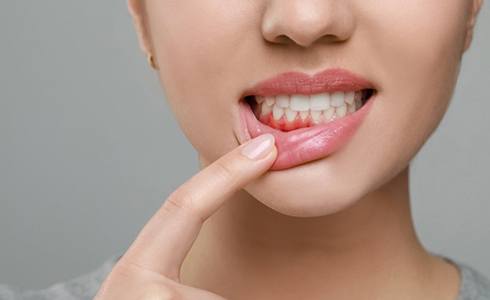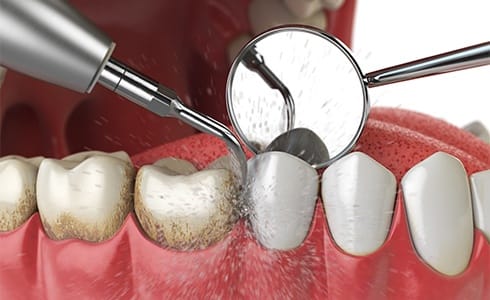Gum Disease Treatment – Oklahoma City, OK
How We Beat Gum Disease
Did you know that the most common dental problem in the world actually isn’t cavities, but rather periodontal disease? Better known as gum disease, this infection attacks both the gums as well as the bone that supports the teeth, which can cause redness, swelling, tenderness, and even tooth loss if left alone. Dr. Hermen takes periodontal disease very seriously and is able to both find and treat it with gum disease treatment in our Oklahoma City, OK dental office to help patients protect their oral health. If your gums feel more sensitive lately or often bleed whenever you clean your teeth, contact us today to get it treated right away!
Why Choose Jeffrey F. Hermen, DDS for Periodontal Therapy?
- Always Goes the Extra Mile for Every Patient
- Gum Screenings Performed at Every Checkup
- Treatments Designed to Remove Infection & Keep It Gone
What Is Gum Disease?

Also known as “periodontal disease,” this condition involves an infection in the gum line as well as the supportive tissues that hold your teeth in place. In many cases, plaque and tartar buildup can occur due to poor oral hygiene, and the accumulated bacteria can start to weaken and damage the gums as well as the surrounding teeth. Gum disease typically has two main stages:
- Gingivitis: The earliest stage of periodontal disease; the symptoms involved in this can often be reversed with improved oral hygiene as well as professional deep cleaning.
- Periodontitis: This condition is a more severe stage of gum disease and will generally have to be managed to avoid the spread of infection and other serious issues, like tooth loss.
Gum disease can occur from a wide variety of factors, including chewing tobacco, smoking, genetic factors, poor oral hygiene, medications, immune-compromising conditions, and even hormonal changes.
Symptoms of Gum Disease

Here are some of the common indications of gum disease that you’ll want to watch out for:
- Inflamed or red gum tissue
- Recession of the gum line
- Tender or sensitive gums
- Bleeding in the gums when brushing or flossing
- Chronic halitosis (bad breath)
- Pain when biting down or chewing
- Sensitive and/or loose teeth
- Changes in your bite
- Tooth loss
How Do We Treat Gum Disease?

Our team will first evaluate your situation, figure out the root cause of your condition, and determine the best way to address the problem during your initial visit. We’ll also thoroughly discuss any symptoms that you’ve been experiencing so that we can get the whole picture. Our team can offer a couple of treatment options, such as scaling and root planing, to help fix the main issue while helping you regain a healthier and more comfortable smile. Here’s what you can expect from each of our solutions.
Scaling & Root Planing

When someone doesn’t brush and floss their teeth consistently, plaque and tartar can build up near the gum line, exposing the nearby tissues to harmful bacteria that irritate, inflame, and eventually start to break them down. To prevent this from happening, we can perform a special cleaning called scaling and root planing. A small scaler helps us remove plaque and tartar from around the gums, and then root planing enables us to reshape and smooth out the root surfaces of the teeth. This makes it more difficult for plaque to accumulate near the gums in the future, lowering the risk of reinfection.
Periodontal Maintenance

Once someone has been diagnosed with periodontal disease, it can’t be fully cured, but the infection can be managed to the point that it doesn’t cause any negative symptoms. In addition to taking excellent care of their teeth at home, we’ll also recommend that a patient come to see us every three to four months for an exam and cleaning. That way, we can keep an eye on the levels of bad bacteria in the mouth and prevent any flare-ups from causing problems.
